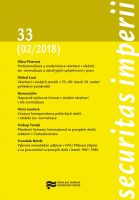Nápravně výchovná činnost v českém vězeňství v éře normalizace
Correctional activities in the Czech prison system in the normalization era
Author(s): Roman JohnSubject(s): Penology
Published by: Ústav pro studium totalitních režimů
Keywords: correctional activity;cultural-correctional work;education of convicts;correction by work;employment of convicts;political prisoners (prisoners of conscience);correctional institution;
Summary/Abstract: As early as the turn of the 1950s and 1960s, Communist regime officials realized that it would be necessary to supplement repression with elements aimed at correcting prisoners. Along with the weakening of the so-called class service of a sentence, efforts were made to introduce professional penitentiary aspects. Legislatively, this trend was expressed by the adoption of Act No. 59/1965 Coll., on the service of terms of imprisonment. The Soviet occupation of the Czechoslovak Socialist Republic in August 1968 did not mean a complete interruption of continuity with the reform movement of the previous decade. However, further development put greater emphasis on the repressive component of the punishment, maximizing the use of labour in the employment of convicts. Although correction by work and cultural‑correctional activity were supposed to make the correction of offenders more effective, the reality was different. The study shows the boundaries that the prison system of that time could not cross. It is a shame of the pre-November regime that it imprisoned people for their beliefs and opinions. Prisoners of conscience had to submit to the correctional system in individual prison facilities. With few exceptions, their situation was worse than for the criminal population, as documented by the passage dealing with the employment of convicts.
Journal: Securitas imperii
- Issue Year: 2018
- Issue No: 33
- Page Range: 50-79
- Page Count: 30
- Language: Czech

